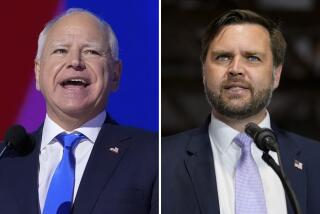Ducking, Bobbing, Weaving: Is This What People Want? : The electorate may be more focused on reality than some spin doctors think
- Share via
Democratic presidential nominee Bill Clinton says he still plans to show up in East Lansing, Mich., next Tuesday. But if he does, it looks as if the Arkansas governor will be making a solo appearance rather than confronting President Bush face to face as the bipartisan Commission on Presidential Debates had hoped. The commission’s terms for debate have been rejected by the Bush campaign, forcing cancellation of next week’s encounter and quite possibly of the two others the commission has tried to arrange. Partisans can argue who gains from all this. What ought to be clear to everyone is that voters are the big losers.
The commission, headed by former Democratic Party chairman Paul G. Kirk Jr. and former Republican Party chairman Frank J. Fahrenkopf Jr., was formed in 1987 with the idea of taking all the partisan squabbling out of debate arrangements.
The commission proposed three 90-minute presidential debates and one debate between the vice presidential candidates, with questions put by a single moderator. Clinton accepted; Bush wants questions to be asked by a panel of journalists. That latter format allows--almost requires--shorter answers while cutting down on the opportunity for follow-up questions aimed at drawing out precise rather than general responses. By insisting on playing by its rules or refusing to play at all, the Bush camp is negating the bipartisan commission’s purpose.
FORUM OF IDEAS: Voters lose, because here for the first time in this campaign would have been a chance to gauge the candidates’ ideas for dealing with the nation’s problems through something other than carefully prepared formal statements or sound bites largely without content.
Here would have been a chance to see how well Bush and Clinton do on their feet, not just in brief responses and retorts, but in sustained exposition. Anyone who doubts that there is a public hunger for serious talk about serious problems, and a disgust with the glitz and sloganeering that most campaigning has become, is not reading the popular mood accurately.
Certainly Ross Perot sensed that hunger, which is why he encouraged a movement in his name, and certainly he senses it still, which is why as he told The Times this week he may reactivate his campaign. Perot’s biggest complaint is that neither Bush nor Clinton is talking about how he would control the swelling federal deficit, arguably the greatest drag on economic growth. He’s right; the candidates are ducking the issue, because if they were to take it on honestly they would be forced to speak about what is conventionally regarded as politically unspeakable. They would have to tell voters that the deficit can be controlled only by cutting spending, which means reducing a lot of government programs people cherish, or by increasing revenues, which means raising taxes. They won’t say that. Perot would, and in doing so he might just force Bush and Clinton finally to get specific about the deficit crisis.
TIME OF TWISTS: That would be one more twist in a campaign year that can already be seen as one of the most unusual in modern times. Two major developments are already apparent: the reshuffle facing Congress--especially the House, where come January as much as one-third of the membership may be new--and the large number of women who have entered contests for state and national offices and the large number who at this point stand a good chance at election in November. A record 11, for example, have already won primaries for Senate seats.
There will be no end to analyses about what it all means, but some preliminary judgments can be made right now. People seem increasingly to have gone from being cynical about the political process to being angry.
Incumbents are one evident target of this anger, while women candidates benefit because, among other reasons, many of them tend to be relatively new entrants into the political arena. It would be comforting to think that the shallowness and dishonesty of so much of what passes for political discourse have become no less a target of righteous public wrath. Certainly that would be one of the most positive things to take place in our political life in a very long time.
More to Read
Get the L.A. Times Politics newsletter
Deeply reported insights into legislation, politics and policy from Sacramento, Washington and beyond. In your inbox twice per week.
You may occasionally receive promotional content from the Los Angeles Times.










